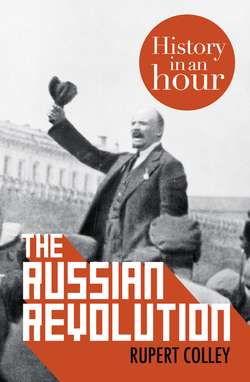Читать книгу The Russian Revolution: History in an Hour - Rupert Colley - Страница 10
ОглавлениеWar
On 28 June 1914, the heir to the Austrian–Hungarian throne, Franz Ferdinand, together with his wife, was assassinated in Sarajevo, capital of Bosnia. The Serbian perpetrators were members of a Bosnian-Serbian terrorist group, the Black Hand, who sought by violent means Serbia’s independence from the Austrian–Hungarian Empire. The Serbian government had no hand in the assassination but it was to them that the Austrian–Hungarian government turned its anger, issuing Serbia an ultimatum designed to humiliate. The Serbians, unable to comply with the demands, found themselves at war with their powerful neighbour, who, as insurance, had sought the endorsement of the even more powerful Germany.
It was to Russia, protector of all Slavs, that Serbia turned. The Tsar ordered the mobilization of his nation’s military in order to wage war on Austria–Hungary. He hoped, nonetheless, to avoid war with Germany. Germany, in turn, gave Russia twelve hours to halt its mobilization. The deadline passed, and on 1 August 1914, Germany declared war on Russia and, two days later, on France. The Great War had begun. Russia’s war would draw in over fifteen million of its men; eight million soldiers or civilians were killed or wounded; and almost seventy million Russians living in the west of the empire found themselves at some point under enemy occupation.
Despite some initial setbacks, war bound much of Russia together. Patriotism ran high, as did the desire to defend the motherland and inflict defeat on its enemy. It was not to last. As general disillusionment set in, the Duma proposed political reform and the formation of a government that would ‘enjoy public confidence’ but the Tsar, again protective of his autocracy, blocked such proposals, sacked all those who had instigated it, and dissolved the Duma.
In 1915, Russia lost Poland and the Baltic States to the Germans and Austrian–Hungarians. In September 1915, the Tsar, furious at the extent of Russian defeats, dismissed the commander-in-chief, his cousin, the Grand Duke Nikolay Nikolayevich, and took personal command of his armed forces. It was a disastrous move as not only did he lack any experience or expertise, he could no longer blame any defeats on his commander-in-chief, for they were now his responsibility.
The Tsarina’s Rule
With Nicholas away at the front and divorced from what was happening in Petrograd (the Tsar had changed the name of St Petersburg to the less Germanic-sounding Petrograd in August 1914), his wife, Alexandra, ruled on his behalf. Influenced entirely by Rasputin, she exasperated the government with a constant change of personnel. The government’s handling of both internal affairs and the economy, and its failure to stem the run of defeats, had many questioning its ability and loyalty.
